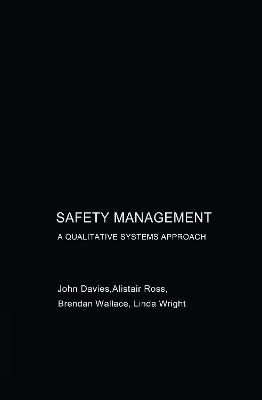
Safety Management
A Qualitative Systems Approach
Seiten
2003
CRC Press (Verlag)
978-0-415-30370-5 (ISBN)
CRC Press (Verlag)
978-0-415-30370-5 (ISBN)
Safety Management argues that it is the methodologies of the human sciences that are more suitable for providing a firm basis for safety management and offers new approaches to safety management in accordance with this view.
Professionals striving for accident reduction must deal with systems in which both technical and human elements play equal and complementary roles. However, many of the existing techniques in ergonomics and risk management concentrate on plant and technical issues and downplay human factors and "subjectivity." Safety Management: A Qualitative Systems Approach describes a body of theories and data that addresses safety by drawing on systems theory and applied psychology, stressing the importance of human activity within systems. It explains in detail the central roles of social consensus and reliability and the nature of verbal reports and functional discourse.
This text presents a new approach to safety management, offering a path to both greater safety and to economic savings. It presents a series of methodological tools that have proven to be reliable through extensive use in the rail and nuclear industries. These methods allow organizational and systems failures to be analyzed much more effectively in terms of quantity, precision, and usefulness.
The concepts and tools described in this book are particularly valuable for reliability engineers, risk managers, human factors specialists, and safety managers and professionals in safety-critical organizations.
Professionals striving for accident reduction must deal with systems in which both technical and human elements play equal and complementary roles. However, many of the existing techniques in ergonomics and risk management concentrate on plant and technical issues and downplay human factors and "subjectivity." Safety Management: A Qualitative Systems Approach describes a body of theories and data that addresses safety by drawing on systems theory and applied psychology, stressing the importance of human activity within systems. It explains in detail the central roles of social consensus and reliability and the nature of verbal reports and functional discourse.
This text presents a new approach to safety management, offering a path to both greater safety and to economic savings. It presents a series of methodological tools that have proven to be reliable through extensive use in the rail and nuclear industries. These methods allow organizational and systems failures to be analyzed much more effectively in terms of quantity, precision, and usefulness.
The concepts and tools described in this book are particularly valuable for reliability engineers, risk managers, human factors specialists, and safety managers and professionals in safety-critical organizations.
Davies, John; Ross, Alastair; Wallace, Brendan; Wallace, Brendan
. Safety, Risk and Responsibility. Safety, Subjectivity and Imagination. Predictive Validity of Near Misses. Confidential Reporting as an Approach to Collecting Near Miss Data. Numbers and Words in Safety Management. Hermeneutics and Accident Reports. Causal Attribution and Safety Management. Inter-Rater Consensus in Safety Management. Error Taxonomies and 'Cognitivism'. Information Arousal Theory (IAT) and Train Driver Behavior. Conclusions.
| Erscheint lt. Verlag | 15.5.2003 |
|---|---|
| Verlagsort | London |
| Sprache | englisch |
| Maße | 152 x 229 mm |
| Gewicht | 498 g |
| Themenwelt | Geisteswissenschaften ► Psychologie ► Arbeits- und Organisationspsychologie |
| Wirtschaft ► Betriebswirtschaft / Management ► Unternehmensführung / Management | |
| ISBN-10 | 0-415-30370-2 / 0415303702 |
| ISBN-13 | 978-0-415-30370-5 / 9780415303705 |
| Zustand | Neuware |
| Haben Sie eine Frage zum Produkt? |
Mehr entdecken
aus dem Bereich
aus dem Bereich
neue Beschäftigte erfolgreich integrieren
Buch | Softcover (2024)
Hogrefe (Verlag)
26,95 €


